If you want to go into the engineering field, earning a degree in electrical engineering or electrical engineering technology may be a great choice. So, what makes these two programs different from one another, and how can you decide which one is right for you? Continue reading to learn more about these degree programs and their career outcomes.
Table of Contents:
Electrical Engineering
Electrical engineers design, develop, test and supervise the manufacturing of electrical equipment. They design new ways to use electrical power to develop new products, perform detailed calculations and direct the manufacturing and installation of electrical equipment to make sure it meets the required standards.
In this degree, you will take accelerated math and science classes to prepare you for advanced coursework in robotics, lasers and optics and computer architecture. You will have the opportunity to participate in hands-on labs in order to develop your problem-solving skills, and capstone projects will allow you to demonstrate what you have learned.
Career Outcomes
Upon completing this degree, you will be prepared to become an electrical engineer. You may succeed in careers in a variety of fields such as computer engineering, communication systems, research, electronics design and manufacturing. Some potential workplaces may include engineering firms, federal government, corporate consulting organizations and research facilities. There are many benefits that come with pursuing a career as an electrical engineer. In addition to financial benefits, you will have the chance to design solutions to real-world problems, which can be very rewarding.
Electrical Engineering Technology
Electrical engineering technologists assist electrical engineers in activities such as process control, electrical power distribution and instrumentation design. Unlike electrical engineers, engineering technologists often work in the production environment in order to address problems and fix them. Technologists determine when machines need to be replaced, and replace the parts and determine the costs of doing so. They work hand-in-hand with electrical engineers to help their ideas come to life.
In the electrical engineering technology program, you will gain hands-on practical knowledge. You will develop a strong understanding of key competencies in circuits, analog and digital electronics, computer design, electronic materials, controls and automation, power and machinery and technical documentation. You will also gain the ability to interact with manufacturing and engineering professionals in order to build and maintain systems. If you want to focus on the application of concepts rather than math-intensive courses, this may be the program for you.
Career Outcomes
With an electrical engineering technology degree, you can translate engineering designs into effective solutions. You may work within electrical system operations for engineering and manufacturing teams as you solve challenges. In addition, this career can also provide you with the opportunity to reflect Christ as you serve others and help them to succeed.
The future is promising for electrical engineer technologists. Overall, the financial benefits combined with the opportunity to serve others and solve industrial challenges make for a fulfilling career.
Which Degree Is Right for Me?
After learning about these two programs, you may be wondering which one is right for you. If you have the desire to design and develop electrical systems such as electric motors, radar and navigation systems, communications systems and power generation equipment, electrical engineering may be the right degree for you.
However, if you want to have a career where you work with equipment hands-on, electrical engineering technology is a great choice. In the end, choosing to pursue either of these degrees can prepare you for an exciting career!
Grand Canyon University’s College of Science, Engineering and Technology offers a wide variety of degree programs that are designed to help you become globally competitive in a STEM occupation. To learn more about GCU’s science and technology programs, visit our website or use the Request More Information button at the top of the page.






